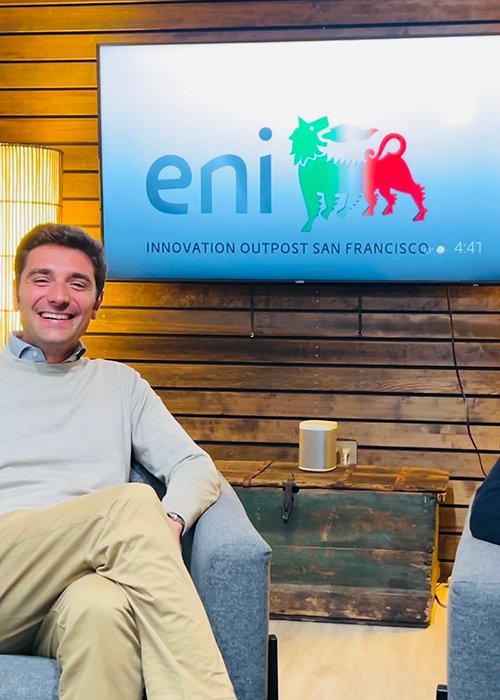If you want to compete with the best, you have to go to the Champions League of start-ups: Silicon Valley. Set yourself a challenge to learn and come back to Italy with a load of skills and knowledge. Fourgreen was among the companies attending the Innovation Bootcamp in Silicon Valley – an intensive full training programme bringing together US investors and Italian startuppers organised by Joule, Eni’s business school.
Fourgreen is a high-tech innovative start-up that offers energy efficiency and environmental sustainability services. Its solutions enable distributors of food & beverage products in the Ho.Re.Ca. channel to achieve carbon-neutrality.
Umberto Napoli, COO & Co-Founder of Fourgreen, and Fabio Iandolo, CEO & Co-Founder, tell us what they learned from this experience meeting the giants of Silicon Valley during seven days in which the iconic American dream became a tangible Italian dream, wide-eyed and grounded in reality.
Umberto, what is the first thing that comes to mind when you think of the Innovation Bootcamp in Silicon Valley?
«The simplicity and direct approach of the American investors we met in San Francisco. For them, everything is black and white, without any ambiguity or hidden agenda. The relationship needs to be fully transparent, in both directions: the start-up must open up with no fear and the investor gives direct but always constructive judgements, aimed at the growth and development of the business. In Silicon Valley, the quality level of the dialogue is extremely high, you get the impression that an opportunity could arrive at any moment.»
What is the first lesson you have learnt?
«It’s a paradox we founders often fall victim to: the so-called curse of knowledge. We are the least suitable people to explain our start-ups to an investor; we are not objective because we know them too well.»
How can you solve this problem?
«By working with an advisor, one with international experience where possible, who can support you in reformulating how you communicate your idea. It’s about communicating your ideas in a simple, clear and direct way.»
Is working with foreign markets essential?
«You have to analyse everything on a case-by-case basis, study the market and the products that a start-up sells, but in general I would say yes, going abroad to measure yourself against other investors is extremely useful. But, let me tell you, no one can hold a candle to the start-up ecosystem in the US because they have huge resources. They play in a league of their own.»
Let’s try to describe the differences using metaphors, compared to other ecosystems...
«I’d choose a football metaphor: we are used to playing on the street, outside our homes, whereas the Americans play in the Champions League. But we mustn’t think of it as a one-way trip. You can go to the US to learn a lot of useful things and come back to Italy, perhaps open a headquarters in both countries, just as American investors ask foreign start-ups to do when they invest in their projects. You have to accept the idea that a having a base in Silicon Valley to access funding may be essential. My advice is to make sure you don’t lose your roots but at the same time think big with an international vision for the business.»
What else struck you?
«The level of preparation of the investors. They knew everything about our start-up, not just what we presented in the pitch. There was extremely thorough feedback on specific aspects. This shows an interest in and respect for our work, as if they were already partners in the start-up they were in negotiations with.»
Can you tell us about another important and unique trait of Silicon Valley?
«The money. This is a really important aspect. We realised that we must not be afraid during negotiations. We have to ask for the right amount of funding even when it comes to large sums. If a start-up doesn’t get sufficient resources, it won’t reach the next round with the expected level of maturity. If, on the other hand, the start-up receives too much funding, there is a risk that no new investors will show up at the next round. In both cases, you waste time and you don’t stick to the roadmap. Pragmatism and planning make the difference.»
Pragmatism implies that you need to act quickly. How do negotiations take place?
«The most surprising thing is the lack of any real negotiation. The relationship between investor and start-up develops on an equal footing. The start-up is looking for funding and networking and the investor provides their resources in exchange for equity in the company. In Italy, on the other hand, start-ups are often submissive and overcautious with investors, falling into a long and complex negotiation that takes the focus away from the business development. This way, startuppers find themselves forced to accept funding that is less than what they actually need and risk not getting what they really need to deliver the proposed solution.»
How would you summarise the mindset that they left you with?
«Think Big! Multiply the area in which you’re thinking of developing your start-up by a factor of 10. Go beyond the boundaries of the market you initially thought of. An idea needs to be stretched, expanded and lengthened. And that has to be done continuously, without fear.»

